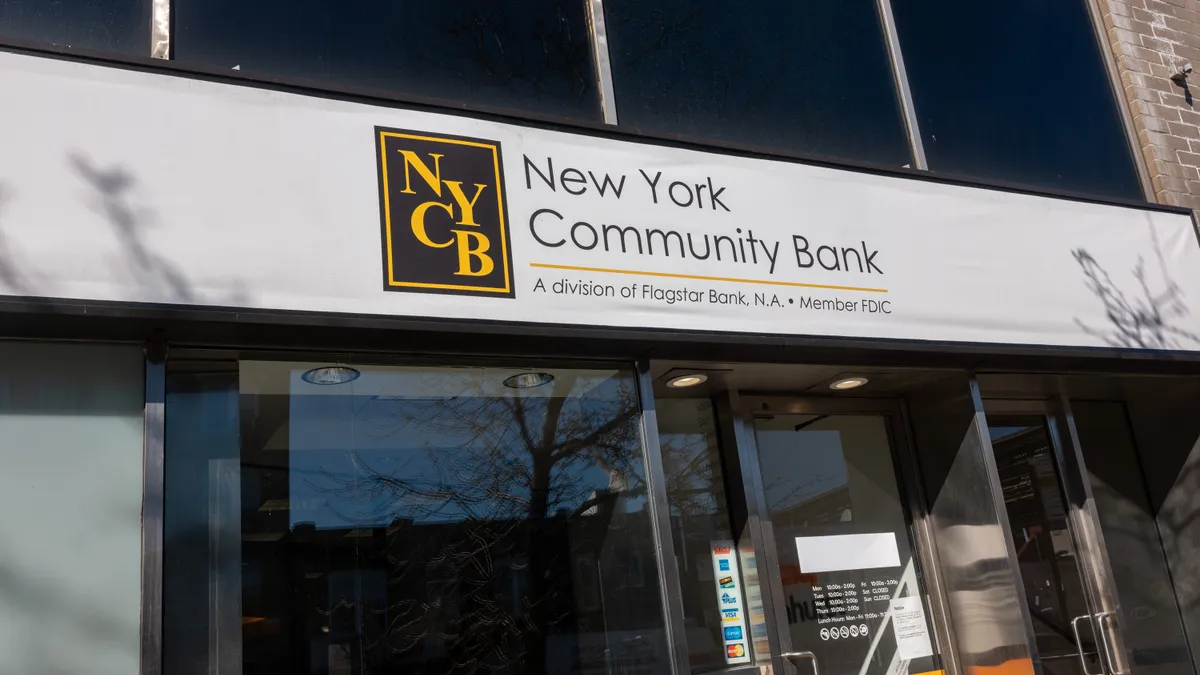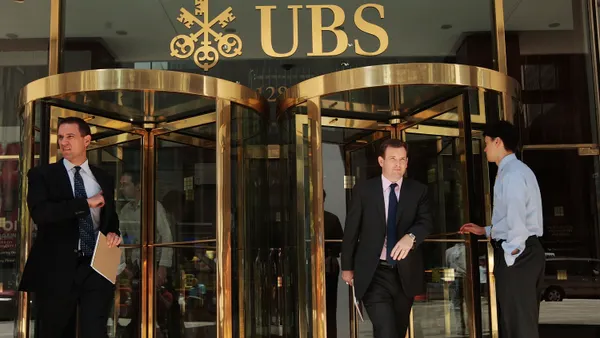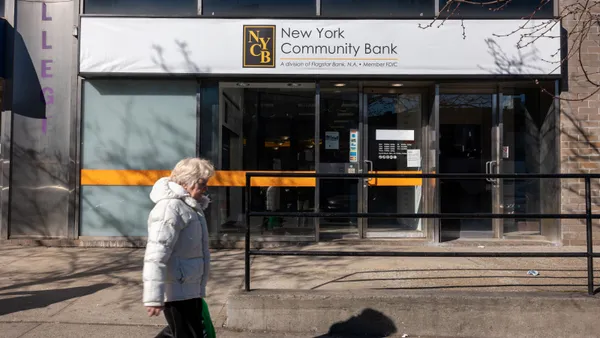On a call Wednesday introducing Alessandro DiNello as New York Community Bank’s executive chair, the former Flagstar CEO emphasized NYCB’s strengths.
"The challenge today is not easy. But this company has a strong foundation, strong liquidity and a strong deposit base, which gives me confidence for our path forward," DiNello told analysts, according to Reuters.
As part of that, DiNello said the bank would be "laser-focused" in reducing its commercial real estate portfolio as quickly as it can, American Banker reported.
"We will build a financial plan that gradually builds capital — no ifs, ands or buts," DiNello said. "If we must shrink, then we'll shrink. If we must sell nonstrategic assets, then we'll do that."
To that end, NYCB has been seeking third-party capital from investors to finance a large portfolio of residential mortgages, people with knowledge of the matter told Bloomberg.
Talks to do so, however, were underway before the bank last week announced it set aside $552 million for credit losses and cut its dividend by more than 70%, the wire service reported.
The bank is also exploring the sale of a roughly $1 billion portfolio of recreational-vehicle and marine loans, a second set of sources told Bloomberg.
The aim would be to boost the bank’s common equity tier 1 ratio, which sat at 9.1% as of Dec. 31. The bank’s leaders want to bring that figure to 10%.
At least one analyst implied the CRE strategy won’t be easy.
“The perceived risk tied to all things commercial real estate is also likely to weigh on investor appetite to step in,” Bank of America analyst Ebrahim Poonawala wrote Wednesday, according to CNBC.
A wild stock ride and another downgrade
The conference call was just the start of a turbulent day for NYCB’s stock, which repeatedly tripped the New York Stock Exchange’s automated circuit breakers meant to keep share value from dropping too quickly, The New York Times reported.
NYCB shares ended the day up 6.7% but lost nearly all of their gains early Thursday, when Morningstar DBRS downgraded the bank's credit rating over its "outsized" exposure to CRE. Moody’s Investors Service made a similar downgrade Tuesday, prompting NYCB to provide an update to its deposit and liquidity statistics.
"Liquidity appears sufficient, but given the bank failures last spring, we remain cautious given that the adverse headline risk, including a significant decline in NYCB's stock price, could eventually spook customer and depositor confidence," Morningstar said, according to Reuters.
At least one analyst, during Wednesday’s call, asked how often NYCB plans to update investors about its liquidity.
"As we see changes in the deposit base, we'll put out information to ensure that what we're seeing is out in the marketplace," CFO John Pinto said, according to American Banker.
Some of the volatility in NYCB’s stock this week can be attributed to reports that the bank’s chief risk and audit officers had left — without an announcement from NYCB and before the bank disclosed its market-surprising fourth-quarter loss.
On that, DiNello said NYCB would announce a new chief risk officer "in the very near future," according to American Banker. The bank is also "in final discussions" with its top candidate for chief audit officer, DiNello added.
Perhaps another source of turbulence is a Bloomberg report that the Q4 loss came amid pressure from the Office of the Comptroller of the Currency.
However, when asked about regulators’ role with NYCB’s boost in loan-loss reserves, DiNello dodged a bit.
"We made some changes in the way we risk-weighted our loan portfolio and came to the conclusion that we needed to take action, and we did," he said, according to American Banker. "This speculation of why and when and who — Look, we did the right thing, and we're going to go forward now."
Analysts’ reaction
Observers’ reactions to the conference call varied from cautiously optimistic to nearly accusatory.
"We believe that management's update should potentially blunt some of the negativity impacting the stock and could drive a short squeeze," Poonawala said in his note, according to Reuters.
Piper Sandler analyst Mark Fitzgibbon took a more skeptical tone in an interview with Bloomberg.
“The executive chairman who went on the call today, he sketched out sort of a nice vision for the company, but didn’t really give a lot of hard numbers. So that just makes it harder for people to triangulate where they’re headed,” Fitzgibbon said. “It just causes uncertainty, and the market hates uncertainty.”
Morgan Stanley analyst Manan Gosalia wrote Wednesday that this week’s NYCB volatility shows that investor sentiment has “shifted ... back toward the risk of an acceleration in CRE nonperforming loans and loan losses over the course of 2024.”
“There’s a confidence crisis here,” Ben Emons, head of fixed income at NewEdge Wealth, told CNBC. “The market doesn’t have belief in this management.”
Yet another observer placed blame on the bank for the surprise aspect of last week’s loss.
“Should they have known that was coming? Yes,” Todd Baker, a senior fellow at Columbia University’s Richman Center, told The New York Times. “It feels clear to me that they really didn’t know how fast they were going to have to adjust. The regulators, having been burned once, are coming down like a ton of bricks.”














